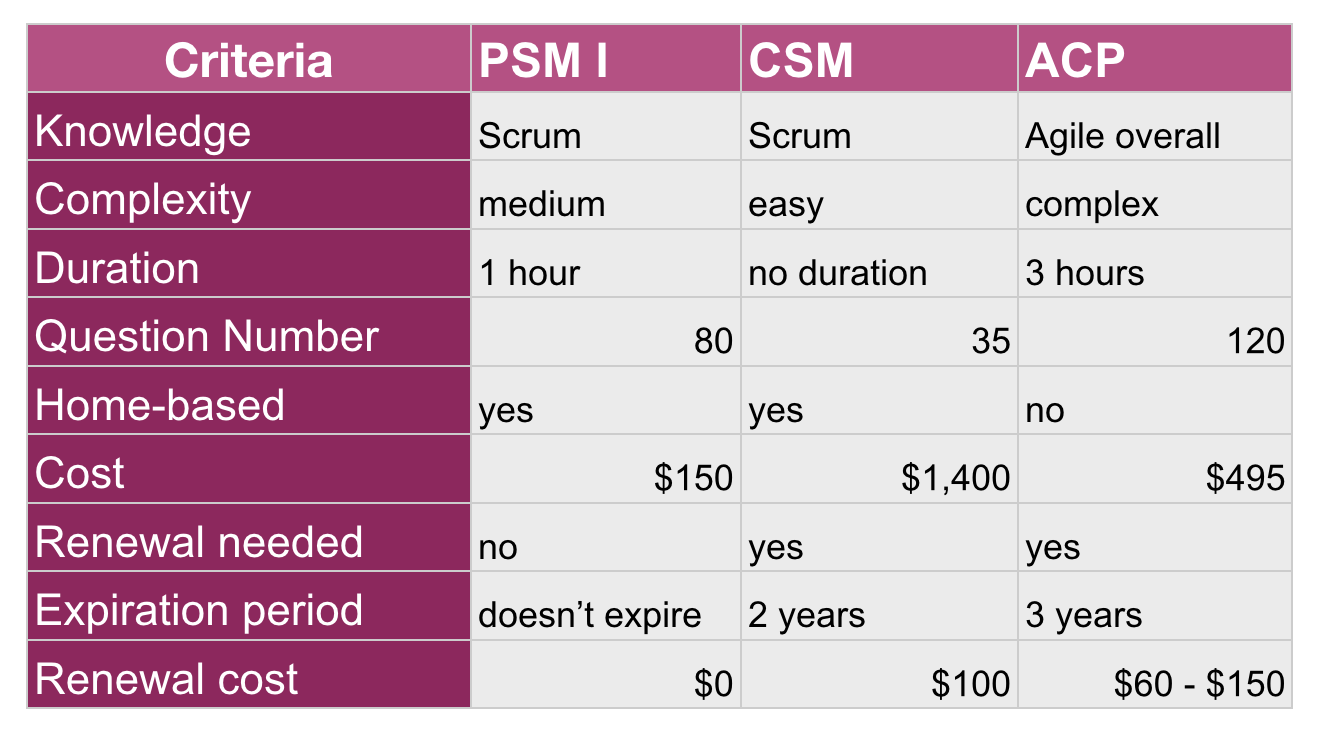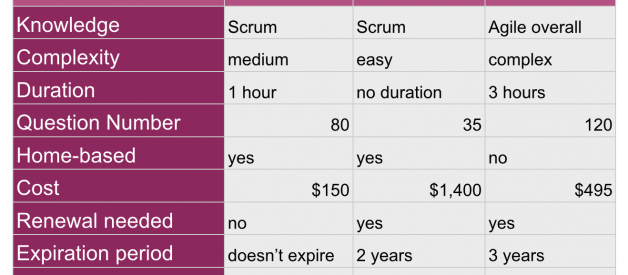If you are thinking about becoming a Scrum Master or already working in this area for some time, it might be good to explore the certification opportunities.
It was a surprise to me, but there are certifications where you don?t need to have any prior experience to pass an exam. And it should be so, because an inexperienced Scrum Master can do so much harm to her team, that the mere thing she can do to prevent it is to get educated and certified first.
There are three major Scrum Master certification providers:
- Scrum.org ? Professional Scrum Master (PSM)
- Scrum Alliance ? Certified Scrum Master (CSM)
- Project Management Institute ? Agile Certified Practitioner (ACP)
Busy guys ? refer to the short certifications comparison at the end of a post.
Scrum.Org Professional Scrum Master (PSM) certification
Scrum.org emerged as an organization after the founders of Scrum, Jeff Sutherland and Ken Schwaber, sort of split up. They founded Scrum Alliance in 2001, but in 2009 Ken left the organization due to the deep disagreement with the board regarding assessments, certification, and a developer program and founded Scrum.org.
I passed a PSM I exam earlier this year, and, as our certification trainer told us, Scrum.org exam required quite a serious preparation, in comparison to the Scrum Alliance exam. This was one of the significant disagreements between Ken and Scrum Alliance, as Ken didn?t want to make the exam too simple so that it would be hard not to pass.
And indeed, when I was taking PSM I, I noticed that the level of complexity was quite high. Though an exam can be taken wherever you want, at home or in the office, and you have the ability to surf the internet or look for the answer in the book, you don?t really have the time to do that. The exam is 1 hour time-boxed, there are 80 questions, so you have less than a minute for 1 question. Questions are formulated so that the wording is not taken directly from the Scrum Guide or Ken?s books, but it makes you stop and think ? what is meant by this question? This was the main thing that made this exam quite hard.
But, on the other hand, nothing will compare to the PMP exam of the Project Management Institute ? read about my experience here. In a nutshell, my experience was awful and it was the hardest exam in my life. Even when I graduated from the university, I didn?t have to take an exam that hard, but not in a sense of knowledge, but in a sense of trickiness. It?s when you are sitting for an exam for 4 hours and can?t get rid of the feeling that somebody is making a fool of you. It took me a year or more to recover from that experience and start thinking about another certification possibility again. That?s why I didn?t consider ACP certification from PMI.
My second experience with certifications (which was PSM I) was much more positive.
You can buy the ability to enroll in an exam at Scrum.org without any mandatory courses. It costs $150 for the first level, PSM I, but there are three levels overall, where PSM II is a level of an experienced Scrum Master and PSM III of an Agile Coach. I wanted to take the PSM II right away, but then thought it might be good to take PSM I first to get a feel of the complexity.
Though you don?t need any courses to be able to take an exam at home, Scrum.org lists many available preparatory courses happening in different parts of the world. I chose the cheapest version close to Slovakia ($700 including an exam), and flew to Ukraine, where I am from, for a 2 day-workshop. It?s great my mother-tongue is Russian, because the course was in this language. Nevertheless, it was a surprise for me, because English was listed as the course language on Scrum.org.
The workshop was just great. The trainer was using Scrum.org certified materials for the course and I loved them. We were discussing non-standard situations in Scrum and, though I have 2.5 years experience working in a Scrum Team as a Scrum Master, I didn?t always know the right answer right away.
The course is a great option for the exam preparation. For example, I learned that I have to pay particular attention to the Scrum Guide roles, in a sense whether a Scrum Master must, should or can do specific actions. These language nuances may not be obvious to a non-English speaker, and that was really helpful. There I learned that there was no Iteration Zero (which was one of the questions on the exam, by the way).
I have a feeling that different certification entities teach you different things. I suspect that Scrum Alliance accepts Iteration Zero as a part of Scrum, as there are many articles about it on their webpage. That?s one of the reasons to take the course before you take an exam.
I also liked the level of our trainer?s knowledge. To become a certified Scrum.org trainer you need to pass the first PSM I and PSM III exams with a score higher than 95%, pass PSM II exam, attend the 3-days offline Trainers course and have a certain number of hours spent with your Scrum Mentor. There are not so many trainers in the world, probably because it?s so hard to become a trainer. Our trainer mentioned that in Central/Eastern Europe there are just 2 or 3 trainers.
At the end of the exam, you?ll receive an email where it says that you are certified and will be listed at Scrum.org site. You can find the list of PSM holders here.
One last thing, which was very important to me, is that the PSM title doesn?t expire. None of the remaining certification entities have that. Scrum.org has a community with scrum webinars, events and blog articles, everything for free.
Scrum Alliance Certified Scrum Master (CSM) certification
Let?s now switch to the Scrum Alliance certification. As I said earlier, it is perceived to be much easier than Scrum.org. I asked a couple of friends who took the exam and they all said it was extremely easy. My Scrum.org course trainer mentioned that the percentage of students who pass the CSM exam is 95%, whereas it?s around 75% for PSM (percentages are not official). Ilia Pavlichenko here says that ?it?s very hard not to pass CSM ?exam? and it?s really hard to pass PSM I?.
There are the 2-day mandatory courses that you need to take in order to be able to sit for a CSM exam. In Slovakia they cost around $1400 (exam included). After the completion of the course you can take the exam at home. What makes it even easier is that it?s not time-limited. On the Mountain Goat Sofware site they say ??plan on taking about an hour to complete the CSM exam, but you don?t need to finish the test in one sitting. You can stop and restart as many times as needed. You can also skip, go back, and bookmark questions for later review.?
Though it?s easy to get certified as a CSM, you will have to renew the title every two years at $100 cost. This is basically the membership fee which gives you the access to Scrum Alliance resources and events. In a comparison to Scrum.org, they have their community membership free and a certificate doesn?t expire.
Project Management Institute Agile Certified Practitioner (ACP) certification
First of all, here you?ll get not only Scrum certified, but also Kanban, Extreme Programming, Lean and Test Driven Development and Agile overall certified, without any specific focus on Scrum Mastership.
The prerequisite to PMI-ACP certification is a completion of several criteria:
- 2,000 hours of general project experience working on teams
- 1,500 hours working on agile project teams or with agile methodologies. This requirement is in addition to the 2,000 hours of general project experience
- 21 contact hours of training in agile practices
The exam costs $495 alone or $435 if you are a member of the PMI organization which will cost you $129 per year.
To claim you have all that, you need to fill out an excel sheet where you?ll describe each of these accomplishments and try to add some proof. I did something similar when applying for PMP. I had to list all my courses, describe my experience, projects I was working on, and provide contact details of people who could verify them. I didn?t get checked, but my friend at IBM did. They called his previous employer.
PMI-ACP exam is taken at the local premises of PMI partners. You can?t do it at home.
I didn?t take the ACP exam, but my friends at IBM did and they say it?s pretty much similar to the PMP exam. Read more about my experience with PMP exam here.
ACP exam contains 120 multiple-choice questions and you have 3 hours to answer them. To maintain the title, one must earn 30 professional development units (PDUs) in agile topics every three years.
The certificate will expire in 3 years and you?ll have to pay $60 to renew it for the next period. The information about renewal on the PMI site doesn?t state that you have to pay, but when I was renewing my PMP credential, I was asked to pay $150 after I claimed all the needed PDUs. It was quite a surprise, so, I assume, you?ll have to pay for the ACP renewal, too, maybe more than $60, if you are not a PMI member.
Relative comparison of the PSM, CSM and ACP certifications for the busy (but not only) people

Conclusion: I would (and I did) choose the PSM certification from Scrum.org, because it seems to offer the best quality/price ratio. There is no renewal needed and the cost is affordable. The exam is relatively hard to pass, so a PSM title holder can be considered to have a robust Scrum knowledge.


